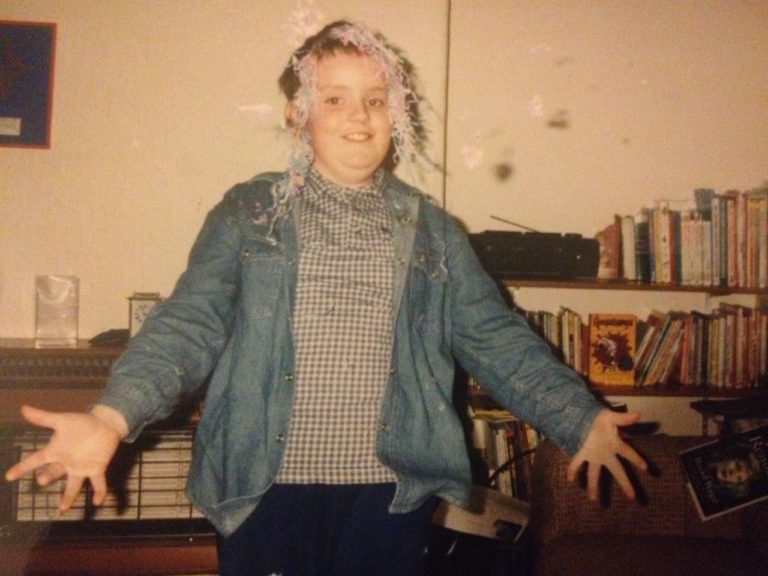1
Andrew woke up with a start.
At first the banging had seemed as though it was coming from outside the window but as his eyes adjusted to the gloom in his bedroom, he heard the thump thump thump thump again, and this time it sounded as though it was inside the house. He pushed back the comforter and, stumbling over his school backpack he’d dropped the evening before, pushed open his door.
He could definitely hear it now. Thump thump thump thump. He looked around the corridor but everywhere was quiet, no light coming from beneath his sister’s door, or his parents. He walked to the top of the stairs and looked down. Darkness. Holding on to the banister, he took each step carefully. In the old house he’d have bounded down, knowing where the steps were by memory, but here, in the house they’d moved to just last week, everything was unfamiliar. At the bottom, he weaved around the cardboard boxes still stacked in the hallway. That sound again. Thump thump thump thump. It was coming from the little room under the stairs, the one his dad had been so excited about, because it meant there was finally a place to put all the shoes he was always tripping over.
Andrew took an intake of breath, coughed slightly from the dust that was everywhere, and walked towards the door. Thump thump thump thump. The sound was getting louder. And his heartbeat too, thump thump thump thump, so the two were almost in-sync. He opened the door slowly. The sound stopped. Andrew screamed.
*
While it’s always been there, a low-level hum which occasionally breaks out into a high-pitched scream, towards the end of 2020 and into 2021, the anxiety that I had lived with, on and off for my whole life, returned with a force I hadn’t expected. When I was in Year 6, a teacher who knew I was keen on reading let me take home his very old and delicate edition of the collected stories of Arthur Conan Doyle. It had a deep-green leather cover, like an aged chair in an old bar. I wanted to please him, so I took it, although I knew I wouldn’t read it. He told me it was precious, that I had to be careful with it. That night just before bed, I checked on the book and noticed a small mark on the front cover. I became convinced it was me who had wounded the book, convinced myself that the teacher would never forgive me, that I would have to face one of the overarching and debilitating fears of my early life, ‘being in trouble’; I gathered up all the pocket money and spare change I could find, and piled it next to the book, ready to take in the next morning. I can’t remember what happened when I went into class the following day, probably nothing, probably the scratch had always been there.
When I was older, and home from university for a holiday, my laptop broke and had to be taken into a shop to be repaired; they had to keep it overnight. Over the course of the evening, I became convinced that they would find something illegal on there, that the authorities would be summoned, that I would be arrested and vilified. Anxious thoughts like these grow, matching the shape and length of installments of a sci-fi series, the unreality of each one being expanded, extended and deepened. The fact that an anxiety may be irrational is not a comfort; a rational fear can be reasoned with, or explained; an irrational one has no counterweight, it cannot be over-thought by sense, because it is an unreality that you find yourself living in. It begins as a droplet in the mind, and ripples outwards, gets in your blood, is pumped around the body. That night, I woke at 1 or 2 a.m., convinced I heard a car pulling up, a door slamming, that the police were here to take me away. Another installment, a few months after this left me unable to board a bus to attend my lectures, convinced that if I did, I’d suddenly need the toilet, and because there wouldn’t be a way to stop the bus, I’d wet myself.
This re-emergence of anxiety in 2020 was both more and less frightening. Less frightening because I knew what it was, but more frightening because I couldn’t pinpoint the single thing which had triggered it. Like the monster in a long-running movie franchise, I recognised it, but couldn’t figure out why it had been summoned. I had a new collection of poetry publishing in the middle of 2021 that was playing on my mind, but that didn’t seem to be the root cause of why I lay in bed, or the bath, unable to move, why I wouldn’t eat, why I couldn’t seem to focus on anything for hours or days at a time, why for the first time in my life I felt like I couldn’t do my job.
My two previous collections of poetry were considered by reviewers to be confessional, or personal, but I’d always considered them to be working with fictions. That’s how I was able to survive the intense disclosures that they entailed. There was a ‘poetry’ me and a ‘home’ me, a performative self and a real self: a self who could go out into the world and ‘confess’ potentially shameful things as a way of reaching through to bigger ideas of intimacy or loss, and have people respond with personal anecdotes in kind; and a self who could come home to a partner and a dog, where poetry didn’t matter. This third collection, which detailed aspects of my home life with my partner for the past half-decade, complicated that divide in a way my practice hadn’t before. My two selves were forced to step into each other, to become one. There could be no more hiding the self from the self. Like wetting oneself on a bus, or a laptop search history revealed, I became convinced there would be a public reckoning, a hyper-visibility, a shaming.
I reached out for help, first to my GP, in search of medication that might make each day more manageable, then to the NHS Mental Health Services who sympathised and said they’d put me on the waiting list for therapy, which they admitted could be at least six months long, and then finally, (because I have the privilege to be able to afford it) to privately-practicing therapists. I didn’t know what I wanted to talk about, what it might be important to raise, so I was recommended what they called open-ended talking therapy.
I think therapy is an unpacking of boxes at first, an opening up of various aspects of your life. At the end of each session you’re left holding newly expanded ideas, which you aren’t quite sure what to do with yet, but eventually you begin to see connections between compartmentalized things which might otherwise have been left unconnected. You begin to rearrange, network and resettle, hopefully, into a more comfortable way of living with yourself.
I talked about the laptop, I talked about the fear of wetting myself in my early twenties, I talked about the feeling of waking clenched each morning, how even though the drugs I eventually got from the pharmacy were meant to lower my heart rate, I still felt this dread viscerally in my stomach, this feeling of being about to be found out and exposed.
‘Is that how it felt in school’, my therapist asked me, ‘when you didn’t want people to know you were gay?’
I looked at the screen, our two flat faces, and I didn’t have a response.
2
The teeth were the first thing Andrew saw leaping out at him, and then the eyes caught the glint of the streetlamp outside and locked onto him like lasers. Andrew staggered back into the hall, he could hear his parents running down the stairs, his dad taking two at a time. He just hoped they got here before the beast reached him, he could smell its breath now, the laser-eyes even closer and then . . .
‘Andrew!’ his mom cried out. ‘Why are you playing with Rex at this hour!’
‘Huh?!’ Andrew looked around confused. His mom, floral dressing gown tied severely at her waist, was standing over him with her arms folded. He looked towards the open door again and was met with a huge wet tongue.
It was Rex! Their old, slow dog. Normally he’d sleep at the foot of Andrew’s bed like he had since he was a puppy, but the move had tired him out and so they’d left him to sleep on the couch.
‘I, uh, heard a noise and so I came downstairs and . . . ’
‘Enough!’ his mom said. ‘I don’t need this at the minute Andrew, everyone back to bed, you too Rex!’
Andrew saw the smirk of Eliza, his sister, as she trudged back upstairs after her parents, having obviously been hoping for something a little more exciting.
Rex must have been exploring and just got locked in there, Andrew supposed. He made sure the door was firmly closed this time and went back up to bed.
As he lay there, waiting for the adrenaline to subside, he would swear on Rex’s life he could still hear that thump thump thump thump. But it was just his own heart he told himself; thump thump thump thump, like an alarm clock ticking, as he finally drifted off to sleep.
*
The connection between queerness and the Goosebumps books is not one I’m newly identifying; every so often someone will tweet a variation of a joke connecting the experience of reading Goosebumps books as a child to being gay. It’s a retroactive queer lens on the books, but also speaks to the draw of the series for kids who might feel like outsiders; there are whole Reddit threads where readers discuss which characters might be considered queer-coded. The hilarious podcast called Welcome to DeadCast (named after the first Goosebumps book Welcome to Dead House), seamlessly blends queer and pop culture references with read-throughs of each of the books from the Goosebumps franchise; playing in songs that relate to a phrase a character said, or finding humour in the friction of Stine’s language when read through the communal dictionary of queer idiolect. In 2007, the Onion ran a parody story alleging that Goosebumps author R.L. Stine had confirmed that Slappy, the famous, murderous ventriloquist’s dummy in Night of the Living Dummy, was in fact gay; a neat satire of similar comments made by famous authors who reinscribe queerness into characters after the fact.
There are moments, however, which run deeper than a retrospective assigning of identity. Others have picked up on, in Why I’m Afraid of Bees, when protagonist Gary is offered the chance to change bodies with someone, and is excited by the “tall, athletic looking blond boy in black Lycra cycling shorts and a blue muscle shirt”; earlier on, Gary is told by the mysterious Miss Karmen, that he can “pick a boy – or even a girl for that matter – to switch places with”. There’s the close friendships of boys which turn up in so many of the books, ones which queer boys perhaps often long for or look at with envy. I remember when I was about fourteen, and a friend I’d been close to for a few years drifted away from me, in part because he found me ‘too camp’. There is an undeniable campness to the more melodramatic moments or the eccentric plot twists. There are neighbours who surveil or feel threatening, seeking to uphold the status quo as cover for something more sinister; older kids in school who beat up or mercilessly tease our protagonists. Maybe that’s what I felt a connection with, as a young boy reading the books in Barnsley. They are after all, not overtly queer. They present glimpses of a particular face of America – heteronormative, white, suburban – and then ask, in that very accepted trope in horror, what might be beneath the surface. The books bend the spines of those straight quiet roads, offering chances for transformation through facing our fears. As I stare at my pile of them now, the missing ones presumably borrowed from libraries rather than bought, I’m seven or eight or nine again, but I no longer feel afraid.
3
Andrew could already hear the rest of his family downstairs when he woke up. He went into the kitchen to find them sat around with bagels and orange juice, the news playing in the background. Rex was snoring loudly in the corner, seemingly unaware of all the commotion he’d caused last night.
‘Be careful Andrew!’ Eliza shouted.
‘What!?’ He whirled around, convinced a spider must be on his shoulder (the house had been vacant for a while before they moved in and there’d been so many dust balls and cobwebs, it still made him itchy to think about it).
He turned back to the table to see Eliza laughing at him between bites of her bagel.
‘Wow, you really are such a scaredy-cat!’ she said.
‘No I’m not, shut up!’
‘Andrew!’ his dad scolded, pouring him a glass of juice. ‘Now me and your mom are going over to the lock-up to pick up some other things today, so Eliza you’re in charge.’
Andrew made a face, and Eliza rolled her eyes.
‘I’m meeting Lilly at the mall today Dad! I’m already the new girl, I can’t be the girl who doesn’t show up as well. Andrew’s old enough to take care of himself now.’
Their dad seemed to think it over for a minute, munching through the last of his bagel. He glanced over at their mom who made a gesture that said ‘Don’t look at me, I’m not getting involved’, and went back to the Home section of the weekend paper.
‘What do you think Andrew, will you be OK on your own?’
He just shrugged and drank his juice down and went to pour himself another one. The thump thump thump thump seemed to be starting up again, but he glanced over, and it was just Rex’s tail thwapping the floor, obviously caught up in some sort of dream. Or maybe a nightmare.
*
The Goosebumps books play their narratives out on identical plot structures; a linguistic floorplan laid onto the page the same way each time, like the uniform buildings of a suburban housing estate. The title sets the premise of the book with a refreshingly direct clarity. The Headless Ghost, Night of the Living Dummy, Night in Werewolf Woods, A Night in Terror Tower, Attack of the Jack -O’-Lanterns. Then the first couple of chapters ramp up the tension, only to deflate it with a revelation that the anxiety was misplaced; different characters seek to convince the protagonist that their fear is erroneous, that they’re being irrational, a narrative gaslighting.
The following chapters follow this bait-and-switch logic until the anxiety of the protagonist can no longer be denied or explained away as a prank, and the young reader is pulled into the ‘scary’ action. Often it feels like a mistake or a dream, but there is always a confirmation of their new reality. And then there’s a denouement and the twist ending, a promise that the story isn’t over, that the fear and the scares will continue, that the characters are still not safe, may not ever be.
The fear of coming out for me was both that I couldn’t fully articulate who it was that I was, a self beyond language, and also that my arrival into my newly visible self would tear asunder the quiet peace of my life. Like Tippi Hedren’s arrival into Bodega Bay in The Birds, somebody new would appear, chaos would be unleashed.
4
As soon as his parents left, Andrew flopped down onto the couch and turned on his favourite video game, Zombie Crush Three. It was better playing it with friends, but he guessed it would take time to meet people he could invite over on weekends now. He wasn’t as easily sociable as Eliza seemed to be.
He was just about to get past the Haunted Hall, the level that always seemed to bamboozle him, when Rex suddenly sat up in the corner of the room. Andrew had forgotten he was there and so when his eye was pulled towards the sudden movement, he lost his concentration, and a hoard of zombies covered his avatar once more.
The screen turned red. ‘you have been eaten,’ the screen said, in deliberately gothic letters.
Andrew was about to turn around to scold Rex, but he’d already moved into the corridor, towards the closet under the stairs. Andrew put down the controller and followed him. Rex was pawing at the door, whining quietly, the way he did when he needed to be let outside.
‘You know that’s not the way into the garden Rex,’ Andrew said, and tried to pull him away by his collar. Rex resisted though, and went straight back to the door.
Then Andrew heard it again. The thump thump thump thump. He froze.
Could it be Rex’s paw hitting the door, making it jar against the frame somehow? But Rex had stopped pawing, almost as though he’d heard it too. Slowly, Andrew stepped towards the door. He didn’t want to open it. Not when there was no one else home. He put his ear to the door, and then jumped back immediately, almost tripping over Rex in the process.
He’d heard a voice, there’d definitely been a voice.
‘Andrew,’ it said. ‘Hello Andrew. Don’t be afraid. I’ve been expecting you.’
*
When my therapist had asked me ‘and is that how it felt in school’, it hit me immediately and took several weeks to process; like being hit by a car then being dragged behind it for miles. I’d forgotten what that fear was like. I had been at school in the last days of Section 28, which was officially repealed when I was fourteen, and so grew up without a language to articulate who I was. The first time I heard the word gay was when someone called me it in school. I knew there was something ‘different’ about me, that I was more drawn towards looking at the bodies of the boys, but I could tell myself that was just because I wanted to look like them, not be with them; that I desired those close friendships, of the kind I knew from the Goosebumps books, not something more. There were questions from classmates about whether or not I had a girlfriend, had I ever kissed a girl; questions which people thought were fun, light, but which filled me with a jolt of horror as though a hand had grabbed the curtain and was about to rip it away, revealing who I really was. Each day I’d get home and think good, they didn’t find out today, and go about regrouping myself to survive again tomorrow.
One day in Year 10, I went out for lunch and accidently left my phone in a classroom. When I realised my mistake and rushed back, someone had already read the messages out to the class. I’d been flirtily texting another boy my age that I’d met online. Everyone was laughing. I left the room humiliated and refused to go back. A friendly teacher helped me hatch a plan. I put the teacher’s phone number in my phone and saved it under the name of the boy I’d been texting. I then sent myself a text from my teacher’s phone saying ‘sorry, those texts were from my mate, we were all really drunk last night’. The next day, I left my phone out again so the class could read that message. As daft as it was, the plan seemed to work. There weren’t too many questions, and I got a girlfriend as a further defence against inquisition. It had been a false twist; not the real horror, just the threat of it.
*
Most things we read and forget, the same way we forget people we kiss or sleep with, but there are some books, some people, that we remember vividly. I bought A Night in Terror Tower in Blackpool, where we’d taken a day trip from Barnsley on the Gee Vee travel coaches for my birthday. I remember visualising the Lord High Executioner, who was chasing the main characters through the chapters, running over the dark hills outside the coach window as we travelled home.
A Night in Terror Tower is a rare Goosebumps title in that it is set in England. Much of the rest of the series takes place on the wide, tree-lined streets of suburban America. Reading the books when I was younger, I was struck with this real desire to be one of the kids in the books: they always seemed to have a group of friends with them, Halloween and trick or treating took place over epic, adventurous nights (we were only allowed to go and knock on our Grandma’s door, not dressed up). American summer camps seemed like the most thrilling holiday’s possible, and I used to pore over catalogues for them. I used to spend a lot of time at my Grandma’s caravan in Cleethorpes, where I bought one of the other books that really left its mark. It was from the camp shop. It wasn’t Goosebumps, but another series, called Shivers, and the book was called The Beast Beneath the Boardwalk, where a tropical storm comes to batter a seafront town. I remember the feeling of reading it on a rainy afternoon inside the caravan, how finishing it felt like stepping, bleary-eyed, back out into the light.
5
Andrew was in the process of talking himself out of what he’d heard when his parents came home. It was probably just something on the loading screen of the game as it waited for him to go back and play. He’d put his name in after all, and maybe it was able to read it back out to him.
‘Are you okay, honey?’ his mom had asked him. ‘You look awfully pale.’
Andrew was sitting on the edge of the couch the game still patiently waiting for him to start playing again. Rex sat at his feet, as though on guard.
‘Huh? Yeah . . . Fine,’ Andrew replied, distractedly.
‘I keep telling you,’ his dad said, ‘the longer you sit in front of those computer games, the more your brain is just going to turn to mush. Here, come and help your mom with the rest of these boxes, I’m going to put these spare bits under the stairs.’
Andrew got up and followed his mother outside to the porch where their childhood bikes and some rusting garden furniture were stacked.
‘Couldn’t we just have gotten rid of all this?’ asked Andrew.
‘Well it’s not like we can afford new stuff now we’ve bought this place and . . . ’
‘OW!’
His mom stopped talking and both her and Andrew whipped around at the same time. It was dad, and it was coming from the closet under the stairs.
His mom jogged into the house and he followed close behind.
‘Frank? What is it, what happened?’
A red face emerged from the gloom.
‘Oh God, Frank, you’re dripping blood everywhere!’
‘Damn wrench was on the top shelf and I didn’t see it, and there’s so little space in there I knocked it off and clocked myself clean on the head with it! I’m okay, it’s worse than it looks!’
‘Andrew, finish bringing that stuff in, I’m going to clean your dad up,’ his mom called over her shoulder as she led his dad towards the kitchen, his arm slung over her shoulder like a casualty of war.
Andrew ran straight over to the closet and poked his head in. He heard the voice again.
‘Andrew, it was an accident. I didn’t mean to. Don’t be mad at me, Andrew.’
He jumped back and slammed the door shut, and the sound started immediately.
Thump. Thump. Thump. Thump.
*
There’s a Kay Ryan poem called ‘Carrying A Ladder’ which begins with a metaphor of an invisible ladder each of us are carrying. Recently I’ve been reading it more and more as an analogy of queerness, though I think it also operates as an allegory for anxiety, for depression, for body dysmorphia, for so many things: ‘We / only know / something’s / the matter: / something precious / crashes’.
It’s almost like in It Came from Beneath the Sink when the protagonist Kat discovers an old sponge underneath the sink of a new home, and every time she takes it near a person, something bad happens to them. Everyone who looks at the sponge just sees a sponge, not the evil alien ‘Grool’ that it actually is. People only know something’s the matter. Something precious crashes.
Sometimes, however, things do become visible. Sometimes in these books, as in life, the worst happens. These aren’t Scooby Doo stories, where the monster is always an ordinary person in a mask. Here, the mask really is haunted. Sometimes, the thing you tell yourself to keep the anxiety in check, that you’re ‘catastrophizing’, that you’re imagining things that won’t really happen, turns out to be a lie. Sometimes you are found out.
When I was sixteen, I was having an argument with my sister, Elizabeth. I shouted something at her, something unkind and unnecessary, and she shouted back, ‘Well, are you gay?’ My mum, sitting on the settee, listening to us but not intervening, looked over at me.
‘Are you?’ she asked.
I had to say I was. I had to take the fear I’d held in my stomach for years, and bring it out into the light. Despite the positive response I received, that fear has never left me. There were the years afterwards when the word gay would still make me flinch, as though my mind had forgotten its own coming out, and now, it’s as though that fear is in my DNA, on the lookout every day for something else to latch on to.
6
The moon came in like a searchlight through the window. Rex had finally plucked up the courage to come upstairs, and was asleep at the foot of Andrew’s bed.
The sound came again, and Andrew realised he’d been waiting for it. Thump thump thump thump. He knew what he had to do.
Without hesitating he went downstairs, as quietly as he could on the old floorboards, and went straight to the closet under the stairs.
Thump. Thump. Thump. Thump.
He put his hand on the doorhandle and slowly pulled it. It creaked open and the sound in the quiet house seemed as loud as a train hitting the brakes at a busy station.
The thumping stopped. Andrew looked up and saw . . . himself? ‘Was it a mirror?’ he thought, and he put a hand out to try and touch the glass, but his hand went straight through the figure in front of him and touched the air behind.
He heard the voice again, but the figure in front of him wasn’t moving his lips. He realised he could hear it in his mind.
‘Andrew, I’m so glad you’ve come. I’ve been so lonely in here. I’ve been waiting for you’
‘Who . . . Who are you?!’ Andrew managed to splutter out.
‘I’m Andrew,’ the voice said. ‘Nice to meet you.’ A ghostly arm raised itself towards him in greeting.
Andrew stepped back, convinced he must be dreaming, but the figure stepped forward in unison with him. The figure was on the threshold of the door now, almost in the hallway.
‘You can’t be real,’ Andrew exclaimed, ‘You must be dust caught in the moonlight or something.’
‘Real?’ the voice said, a bit more agitated now. ‘Of course I’m real Andrew, I’m you!’
The figure stepped forward until he was face to face with Andrew. He looked at him with his dark eyes and then moved forward again.
Andrew felt a shiver, like an electric shock, move up from the base of his spine to his brain, and then a tingling feeling, like pins and needles. And then nothing.
There was no sound anymore. Everything was quiet.
‘Where did you go?’ Andrew whispered.
‘Nowhere,’ said the voice in his mind. ‘I’m still here, I stepped into you and became a part of you. We’re not separate anymore, we’re one.’
Andrew touched his face, it still felt like his. He turned to run back upstairs, convinced it was a dream, and there was his mom, standing on the bottom step, staring at him.
‘Oh Mom!’ Andrew cried, ‘I was having the worst dream.’
But his mom didn’t say anything, just looked at him like someone she had never met before.
Feature image © teakwood
Photograph © Andrew McMillan









